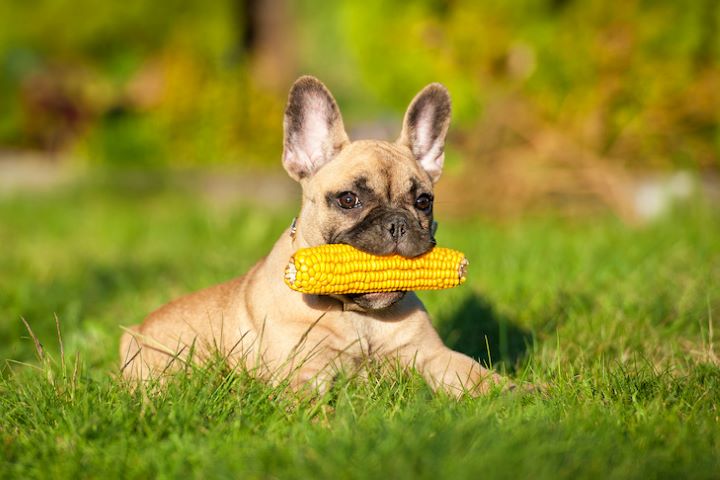Picture this: You’re enjoying a summer barbecue with grilled corn on the cob, and your furry best friend is eyeing your plate. Your dog seems curious about the corn, and you might be wondering if it’s safe to share this golden treat with them. The question is, can dogs eat corn? In this blog, we’ll explore the corn-undrum and help you understand the dos and don’ts of feeding corn to your canine companion.
The Basics of Corn in a Dog’s Diet:
1. Corn as a Filler: Corn is a common ingredient in many commercial dog foods. It’s used as a source of carbohydrates and provides energy. While it’s not the most biologically appropriate option for dogs, it’s often used as a filler due to its low cost.
2. Dogs Are Omnivores: Dogs are omnivores, which means they can consume both animal and plant-based foods. However, their primary source of nutrition should come from high-quality animal proteins.
3. Nutritional Value: Corn contains carbohydrates, fiber, vitamins, and minerals. While it’s not a bad source of these nutrients, it’s also not the best source. Dogs can obtain their required nutrients more efficiently from other sources, like meat.
The Good Side of Corn for Dogs:
1. Digestible Carbohydrates: Corn is a source of carbohydrates, providing a quick energy boost for active dogs. The digestibility of corn can vary depending on how it’s prepared. For instance, whole corn kernels are less digestible than cornmeal.
2. Fiber: Corn contains dietary fiber, which can aid in digestion and help maintain healthy bowel movements.
3. Antioxidants: Corn also contains antioxidants like lutein and zeaxanthin, which can benefit your dog’s eye health.
Corn on the Cob: A Cautionary Tale:
While small amounts of corn are generally safe for dogs, there are important caveats to consider:
1. Corn Cobs: The corn cob is the heart of the corn-undrum. Dogs should never eat corn on the cob. Corn cobs can be a choking hazard, and the dog’s digestive system is not equipped to process them. Ingesting a corn cob can lead to a life-threatening intestinal blockage.
2. Butter and Seasonings: If you’re sharing corn with your dog, make sure it’s plain, cooked corn without added butter, salt, or seasonings. These additives can be harmful to dogs.
3. Allergies: Just like humans, dogs can have food allergies. Corn is a common allergen for some dogs, and it can lead to symptoms like skin itching, digestive upset, and ear infections.
Portion Control:
If you decide to offer your dog corn, keep portion sizes small. Corn should never replace a dog’s regular, balanced diet. It’s an occasional treat rather than a staple food. Moderation is key.
The Popcorn Predicament:
Plain, air-popped popcorn is a safer option for dogs. It’s light, low in calories, and provides a satisfying crunch. However, you should still be cautious:
1. Unpopped Kernels: Be vigilant about unpopped kernels in your popcorn. These can be a choking hazard.
2. No Butter or Salt: Never share buttered or salted popcorn with your dog. These additives can be detrimental to their health.
3. Portion Control: Offer popcorn as an occasional snack and not a regular part of your dog’s diet.
When to Avoid Corn Altogether:
There are situations where you should avoid giving corn to your dog:
1. Diabetic Dogs: Corn is high in carbohydrates, so it can cause spikes in blood sugar levels. If your dog has diabetes, it’s best to avoid corn or offer it in very controlled amounts.
2. Allergic Reactions: If you’ve observed that your dog is allergic to corn or experiences adverse reactions, it’s essential to steer clear of it entirely.
3. Weight Concerns: If your dog is overweight or prone to obesity, it’s best to limit or avoid corn due to its carbohydrate content.
Conclusion: Can Dogs Eat Corn?
In the grand corn-undrum of whether dogs can eat corn, the answer is both yes and no. Small amounts of plain, cooked corn can be safe for most dogs, but it should be viewed as an occasional treat rather than a staple food. Corn on the cob and any form of corn with added butter, salt, or seasonings should be avoided. As with any dietary changes or additions, it’s essential to monitor your dog for any adverse reactions and consult your veterinarian if you have concerns about their diet. Ultimately, the health and well-being of your furry friend should be your top priority.
References:
https://pubmed.ncbi.nlm.nih.gov/34078195/
https://www.ncbi.nlm.nih.gov/pmc/articles/PMC10066843/













